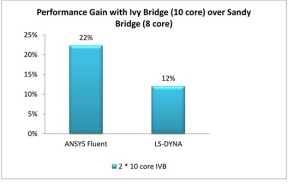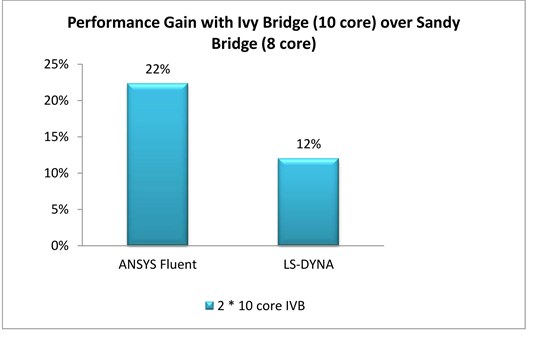 Over at the Dell HPC Blog, Mayura Deshmukh writes that NCSA’s Private Sector Program has done some interesting work analyzing the performance benefits of the new Intel Xeon E5-2600 v2 processors (code-named Ivy Bridge) over the previous generation E5-2600 series (code-named Sandy Bridge). With a focus on applications in the manufacturing sector, the study included a mix of commercial and open source applications like ANSYS Fluent, LS-DYNA, Simulia Abaqus, MUMPS, and LAMMPS.
Over at the Dell HPC Blog, Mayura Deshmukh writes that NCSA’s Private Sector Program has done some interesting work analyzing the performance benefits of the new Intel Xeon E5-2600 v2 processors (code-named Ivy Bridge) over the previous generation E5-2600 series (code-named Sandy Bridge). With a focus on applications in the manufacturing sector, the study included a mix of commercial and open source applications like ANSYS Fluent, LS-DYNA, Simulia Abaqus, MUMPS, and LAMMPS.
NCSA’s testing results show that the Ivy Bridge processors provide better performance compared to the Sandy Bridge for all the applications. The actual improvement depends on the application and its characteristics. The cost/benefit analysis of upgrading to IVB processors should be done based on a particular application workload, and not just based on number cores or higher clock rates. Still, the work conducted by NCSA gives users insights into the performance gains they can expect for these widely-used applications. Dell and NCSA continue to work together to investigate new HPC technologies and provide clear information to users from industry, with the shared goal of helping this community improve the performance of its applications and make informed, data-driven decisions about its HPC solutions.
Read the Full Story.
In this video from the DDN User Group at ISC’14, Merle Giles describes the NCSA Private Sector Program in a presentation entitled: Industrial Supercomputing, Why Do We Care?




